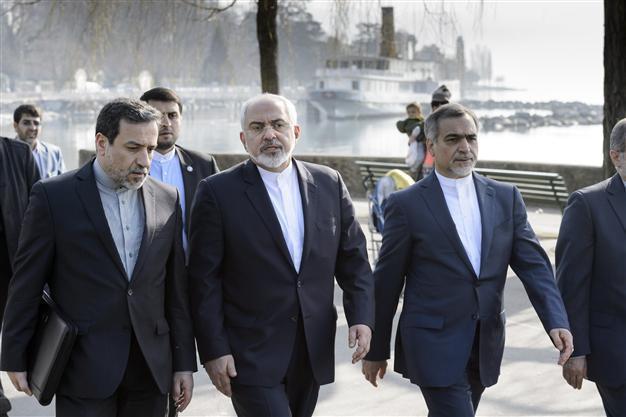Iran's Zarif downplays nuclear deal prospects in Lausanne
TEHRAN - Agence France-Presse

Iranian Foreign Minister Mohammad Javad Zarif, center,walks outside the hotel during a break from a bilateral meeting with U.S. Secretary of State John Kerry for a new round of Nuclear Talks, in Lausanne, Switzerland, Wednesday, March 18, 2015. AP Photo
Iran's Foreign Minister Mohammad Javad Zarif on Wednesday played down the chances of reaching a nuclear agreement during talks under way this week in the Swiss city of Lausanne.Foreign ministers of the other world powers negotiating with Iran are unlikely to be required in Lausanne to approve a deal, said Zarif, who has been holding two-way talks with US Secretary of State John Kerry.
"I don't think their presence will be needed in this round because when the solutions are found and we approach a deal, then all the foreign ministers of the negotiating parties should come," state media quoted him as saying.
"They might come, but at this stage I wouldn't think they are needed," he repeated, referring to the top diplomats of the so-called P5+1 (Britain, China, France, Russia, the United States, and Germany).
On day three of talks with Kerry, Zarif said "there are differences and we are trying to reduce them," by Thursday evening, with political directors of the 5+1 countries starting to arrive in Lausanne on Wednesday.
"We must find solutions," he said.
"The question of an agreement comes when we have solutions written on paper, and to write the solutions we need the experts more than foreign ministers."
The minister said that the two sides had reached "very fine details in the negotiations and details always require more work".
The United States on Tuesday evaluated at 50/50 the chances of sealing a political agreement with Iran on its controversial nuclear programme by the end of March.
Iran and six world powers aim to agree the framework of a nuclear deal by March 31 and then have a full deal by July 1.
Such an agreement, they hope, will convince the world that Iran will not develop nuclear weapons under the guise of its civilian programme, a goal Tehran strenuously denies having.
















